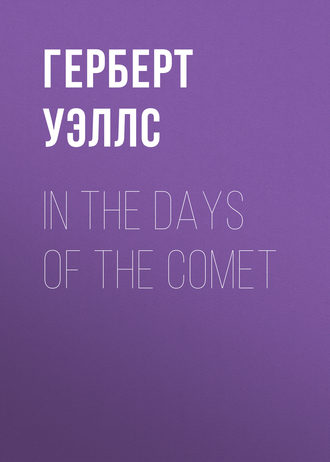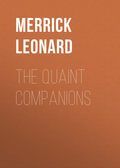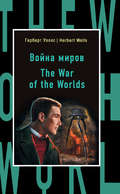
Герберт Джордж Уэллс
In the Days of the Comet
Section 4
"What are we to do?" asked Verrall.
Nettie drew a deep crimson carnation from the bowl before us, and began very neatly and deliberately to turn down the sepals of its calyx and remove, one by one, its petals. I remember that went on through all our talk. She put those ragged crimson shreds in a long row and adjusted them and readjusted them. When at last I was alone with these vestiges the pattern was still incomplete.
"Well," said I, "the matter seems fairly simple. You two" – I swallowed it – "love one another."
I paused. They answered me by silence, by a thoughtful silence.
"You belong to each other. I have thought it over and looked at it from many points of view. I happened to want – impossible things.
.. I behaved badly. I had no right to pursue you." I turned to Verrall. "You hold yourself bound to her?"
He nodded assent.
"No social influence, no fading out of all this generous clearness in the air – for that might happen – will change you back.. ?"
He answered me with honest eyes meeting mine, "No, Leadford, no!"
"I did not know you," I said. "I thought of you as something very different from this."
"I was," he interpolated.
"Now," I said, "it is all changed."
Then I halted – for my thread had slipped away from me.
"As for me," I went on, and glanced at Nettie's downcast face, and then sat forward with my eyes upon the flowers between us, "since I am swayed and shall be swayed by an affection for Nettie, since that affection is rich with the seeds of desire, since to see her yours and wholly yours is not to be endured by me – I must turn about and go from you; you must avoid me and I you… We must divide the world like Jacob and Esau… I must direct myself with all the will I have to other things. After all – this passion is not life! It is perhaps for brutes and savages, but for men. No! We must part and I must forget. What else is there but that?"
I did not look up, I sat very tense with the red petals printing an indelible memory in my brain, but I felt the assent of Verrall's pose. There were some moments of silence. Then Nettie spoke. "But – " she said, and ceased.
I waited for a little while. I sighed and leant back in my chair.
"It is perfectly simple," I smiled, "now that we have cool heads."
"But IS it simple?" asked Nettie, and slashed my discourse out of being.
I looked up and found her with her eyes on Verrall. "You see," she said, "I like Willie. It's hard to say what one feels – but I don't want him to go away like that."
"But then," objected Verrall, "how – ?"
"No," said Nettie, and swept her half-arranged carnation petals back into a heap of confusion. She began to arrange them very quickly into one long straight line.
"It's so difficult – I've never before in all my life tried to get to the bottom of my mind. For one thing, I've not treated Willie properly. He – he counted on me. I know he did. I was his hope. I was a promised delight – something, something to crown life – better than anything he had ever had. And a secret pride… He lived upon me. I knew – when we two began to meet together, you and I – It was a sort of treachery to him – "
"Treachery!" I said. "You were only feeling your way through all these perplexities."
"You thought it treachery."
"I don't now."
"I did. In a sense I think so still. For you had need of me."
I made a slight protest at this doctrine and fell thinking.
"And even when he was trying to kill us," she said to her lover, "I felt for him down in the bottom of my mind. I can understand all the horrible things, the humiliation – the humiliation! he went through."
"Yes," I said, "but I don't see – "
"I don't see. I'm only trying to see. But you know, Willie, you are a part of my life. I have known you longer than I have known Edward. I know you better. Indeed I know you with all my heart. You think all your talk was thrown away upon me, that I never understood that side of you, or your ambitions or anything. I did. More than I thought at the time. Now – now it is all clear to me. What I had to understand in you was something deeper than Edward brought me. I have it now… You are a part of my life, and I don't want to cut all that off from me now I have comprehended it, and throw it away."
"But you love Verrall."
"Love is such a queer thing!.. Is there one love? I mean, only one love?" She turned to Verrall. "I know I love you. I can speak out about that now. Before this morning I couldn't have done. It's just as though my mind had got out of a scented prison. But what is it, this love for you? It's a mass of fancies – things about you – ways you look, ways you have. It's the senses – and the senses of certain beauties. Flattery too, things you said, hopes and deceptions for myself. And all that had rolled up together and taken to itself the wild help of those deep emotions that slumbered in my body; it seemed everything. But it wasn't. How can I describe it? It was like having a very bright lamp with a thick shade – everything else in the room was hidden. But you take the shade off and there they are – it is the same light – still there! Only it lights every one!"
Her voice ceased. For awhile no one spoke, and Nettie, with a quick movement, swept the petals into the shape of a pyramid.
Figures of speech always distract me, and it ran through my mind like some puzzling refrain, "It is still the same light.."
"No woman believes these things," she asserted abruptly.
"What things?"
"No woman ever has believed them."
"You have to choose a man," said Verrall, apprehending her before I did.
"We're brought up to that. We're told – it's in books, in stories, in the way people look, in the way they behave – one day there will come a man. He will be everything, no one else will be anything. Leave everything else; live in him."
"And a man, too, is taught that of some woman," said Verrall.
"Only men don't believe it! They have more obstinate minds… Men have never behaved as though they believed it. One need not be old to know that. By nature they don't believe it. But a woman believes nothing by nature. She goes into a mold hiding her secret thoughts almost from herself."
"She used to," I said.
"You haven't," said Verrall, "anyhow."
"I've come out. It's this comet. And Willie. And because I never really believed in the mold at all – even if I thought I did. It's stupid to send Willie off – shamed, cast out, never to see him again – when I like him as much as I do. It is cruel, it is wicked and ugly, to prance over him as if he was a defeated enemy, and pretend I'm going to be happy just the same. There's no sense in a rule of life that prescribes that. It's selfish. It's brutish. It's like something that has no sense. I – " there was a sob in her voice: "Willie! I WON'T."
I sat lowering, I mused with my eyes upon her quick fingers.
"It IS brutish," I said at last, with a careful unemotional deliberation. "Nevertheless – it is in the nature of things… No!.. You see, after all, we are still half brutes, Nettie. And men, as you say, are more obstinate than women. The comet hasn't altered that; it's only made it clearer. We have come into being through a tumult of blind forces… I come back to what I said just now; we have found our poor reasonable minds, our wills to live well, ourselves, adrift on a wash of instincts, passions, instinctive prejudices, half animal stupidities… Here we are like people clinging to something – like people awakening – upon a raft."
"We come back at last to my question," said Verrall, softly; "what are we to do?"
"Part," I said. "You see, Nettie, these bodies of ours are not the bodies of angels. They are the same bodies – I have read somewhere that in our bodies you can find evidence of the lowliest ancestry; that about our inward ears – I think it is – and about our teeth, there remains still something of the fish, that there are bones that recall little – what is it? – marsupial forebears – and a hundred traces of the ape. Even your beautiful body, Nettie, carries this taint. No! Hear me out." I leant forward earnestly. "Our emotions, our passions, our desires, the substance of them, like the substance of our bodies, is an animal, a competing thing, as well as a desiring thing. You speak to us now a mind to minds – one can do that when one has had exercise and when one has eaten, when one is not doing anything – but when one turns to live, one turns again to matter."
"Yes," said Nettie, slowly following me, "but you control it."
"Only through a measure of obedience. There is no magic in the business – to conquer matter, we must divide the enemy, and take matter as an ally. Nowadays it is indeed true, by faith a man can remove mountains; he can say to a mountain, Be thou removed and be thou cast into the sea; but he does it because he helps and trusts his brother men, because he has the wit and patience and courage to win over to his side iron, steel, obedience, dynamite, cranes, trucks, the money of other people… To conquer my desire for you, I must not perpetually thwart it by your presence; I must go away so that I may not see you, I must take up other interests, thrust myself into struggles and discussions – "
"And forget?" said Nettie.
"Not forget," I said; "but anyhow – cease to brood upon you."
She hung on that for some moments.
"No," she said, demolished her last pattern and looked up at Verrall as he stirred.
Verrall leant forward on the table, elbows upon it, and the fingers of his two hands intertwined.
"You know," he said, "I haven't thought much of these things. At school and the university, one doesn't… It was part of the system to prevent it. They'll alter all that, no doubt. We seem" – he thought – "to be skating about over questions that one came to at last in Greek – with variorum readings – in Plato, but which it never occurred to any one to translate out of a dead language into living realities.." He halted and answered some unspoken question from his own mind with, "No. I think with Leadford, Nettie, that, as he put it, it is in the nature of things for men to be exclusive… Minds are free things and go about the world, but only one man can possess a woman. You must dismiss rivals. We are made for the struggle for existence – we ARE the struggle for existence; the things that live are the struggle for existence incarnate – and that works out that the men struggle for their mates; for each woman one prevails. The others go away."
"Like animals," said Nettie.
"Yes.."
"There are many things in life," I said, "but that is the rough universal truth."
"But," said Nettie, "you don't struggle. That has been altered because men have minds."
"You choose," I said.
"If I don't choose to choose?"
"You have chosen."
She gave a little impatient "Oh! Why are women always the slaves of sex? Is this great age of Reason and Light that has come to alter nothing of that? And men too! I think it is all – stupid. I do not believe this is the right solution of the thing, or anything but the bad habits of the time that was.. Instinct! You don't let your instincts rule you in a lot of other things. Here am I between you. Here is Edward. I – love him because he is gay and pleasant, and because – because I LIKE him! Here is Willie – a part of me – my first secret, my oldest friend! Why must I not have both? Am I not a mind that you must think of me as nothing but a woman? imagine me always as a thing to struggle for?" She paused; then she made her distressful proposition to me. "Let us three keep together," she said. "Let us not part. To part is hate, Willie. Why should we not anyhow keep friends? Meet and talk?"
"Talk?" I said. "About this sort of thing?"
I looked across at Verrall and met his eyes, and we studied one another. It was the clean, straight scrutiny of honest antagonism. "No," I decided. "Between us, nothing of that sort can be."
"Ever?" said Nettie.
"Never," I said, convinced.
I made an effort within myself. "We cannot tamper with the law and customs of these things," I said; "these passions are too close to one's essential self. Better surgery than a lingering disease! From Nettie my love – asks all. A man's love is not devotion – it is a demand, a challenge. And besides" – and here I forced my theme – "I have given myself now to a new mistress – and it is I, Nettie, who am unfaithful. Behind you and above you rises the coming City of the World, and I am in that building. Dear heart! you are only happiness – and that – Indeed that calls! If it is only that my life blood shall christen the foundation stones – I could almost hope that should be my part, Nettie – I will join myself in that." I threw all the conviction I could into these words… "No conflict of passion." I added a little lamely, "must distract me."
There was a pause.
"Then we must part," said Nettie, with the eyes of a woman one strikes in the face.
I nodded assent..
There was a little pause, and then I stood up. We stood up, all three. We parted almost sullenly, with no more memorable words, and I was left presently in the arbor alone.
I do not think I watched them go. I only remember myself left there somehow – horribly empty and alone. I sat down again and fell into a deep shapeless musing.
Section 5
Suddenly I looked up. Nettie had come back and stood looking down at me.
"Since we talked I have been thinking," she said. "Edward has let me come to you alone. And I feel perhaps I can talk better to you alone."
I said nothing and that embarrassed her.
"I don't think we ought to part," she said.
"No – I don't think we ought to part," she repeated.
"One lives," she said, "in different ways. I wonder if you will understand what I am saying, Willie. It is hard to say what I feel. But I want it said. If we are to part for ever I want it said – very plainly. Always before I have had the woman's instinct and the woman's training which makes one hide. But – Edward is not all of me. Think of what I am saying – Edward is not all of me… I wish I could tell you better how I see it. I am not all of myself. You, at any rate, are a part of me and I cannot bear to leave you. And I cannot see why I should leave you. There is a sort of blood link between us, Willie. We grew together. We are in one another's bones. I understand you. Now indeed I understand. In some way I have come to an understanding at a stride. Indeed I understand you and your dream. I want to help you. Edward – Edward has no dreams… It is dreadful to me, Willie, to think we two are to part."
"But we have settled that – part we must."
"But WHY?"
"I love you."
"Well, and why should I hide it Willie? – I love you.." Our eyes met. She flushed, she went on resolutely: "You are stupid. The whole thing is stupid. I love you both."
I said, "You do not understand what you say. No!"
"You mean that I must go."
"Yes, yes. Go!"
For a moment we looked at one another, mute, as though deep down in the unfathomable darkness below the surface and present reality of things dumb meanings strove to be. She made to speak and desisted.
"But MUST I go?" she said at last, with quivering lips, and the tears in her eyes were stars. Then she began, "Willie – "
"Go!" I interrupted her… "Yes."
Then again we were still.
She stood there, a tearful figure of pity, longing for me, pitying me. Something of that wider love, that will carry our descendants at last out of all the limits, the hard, clear obligations of our personal life, moved us, like the first breath of a coming wind out of heaven that stirs and passes away. I had an impulse to take her hand and kiss it, and then a trembling came to me, and I knew that if I touched her, my strength would all pass from me..
And so, standing at a distance one from the other, we parted, and Nettie went, reluctant and looking back, with the man she had chosen, to the lot she had chosen, out of my life – like the sunlight out of my life..
Then, you know, I suppose I folded up this newspaper and put it in my pocket. But my memory of that meeting ends with the face of Nettie turning to go.
Section 6
I remember all that very distinctly to this day. I could almost vouch for the words I have put into our several mouths. Then comes a blank. I have a dim memory of being back in the house near the Links and the bustle of Melmount's departure, of finding Parker's energy distasteful, and of going away down the road with a strong desire to say good-bye to Melmount alone.
Perhaps I was already doubting my decision to part for ever from Nettie, for I think I had it in mind to tell him all that had been said and done..
I don't think I had a word with him or anything but a hurried hand clasp. I am not sure. It has gone out of my mind. But I have a very clear and certain memory of my phase of bleak desolation as I watched his car recede and climb and vanish over Mapleborough Hill, and that I got there my first full and definite intimation that, after all, this great Change and my new wide aims in life, were not to mean indiscriminate happiness for me. I had a sense of protest, as against extreme unfairness, as I saw him go. "It is too soon," I said to myself, "to leave me alone."
I felt I had sacrificed too much, that after I had said good-bye to the hot immediate life of passion, to Nettie and desire, to physical and personal rivalry, to all that was most intensely myself, it was wrong to leave me alone and sore hearted, to go on at once with these steely cold duties of the wider life. I felt new born, and naked, and at a loss.
"Work!" I said with an effort at the heroic, and turned about with a sigh, and I was glad that the way I had to go would at least take me to my mother..
But, curiously enough, I remember myself as being fairly cheerful in the town of Birmingham that night, I recall an active and interested mood. I spent the night in Birmingham because the train service on was disarranged, and I could not get on. I went to listen to a band that was playing its brassy old-world music in the public park, and I fell into conversation with a man who said he had been a reporter upon one of their minor local papers. He was full and keen upon all the plans of reconstruction that were now shaping over the lives of humanity, and I know that something of that noble dream came back to me with his words and phrases. We walked up to a place called Bourneville by moonlight, and talked of the new social groupings that must replace the old isolated homes, and how the people would be housed.
This Bourneville was germane to that matter. It had been an attempt on the part of a private firm of manufacturers to improve the housing of their workers. To our ideas to-day it would seem the feeblest of benevolent efforts, but at the time it was extraordinary and famous, and people came long journeys to see its trim cottages with baths sunk under the kitchen floors (of all conceivable places), and other brilliant inventions. No one seemed to see the danger to liberty in that aggressive age, that might arise through making workpeople tenants and debtors of their employer, though an Act called the Truck Act had long ago intervened to prevent minor developments in the same direction… But I and my chance acquaintance seemed that night always to have been aware of that possibility, and we had no doubt in our minds of the public nature of the housing duty. Our interest lay rather in the possibility of common nurseries and kitchens and public rooms that should economize toil and give people space and freedom.
It was very interesting, but still a little cheerless, and when I lay in bed that night I thought of Nettie and the queer modifications of preference she had made, and among other things and in a way, I prayed. I prayed that night, let me confess it, to an image I had set up in my heart, an image that still serves with me as a symbol for things inconceivable, to a Master Artificer, the unseen captain of all who go about the building of the world, the making of mankind.
But before and after I prayed I imagined I was talking and reasoning and meeting again with Nettie… She never came into the temple of that worshiping with me.







